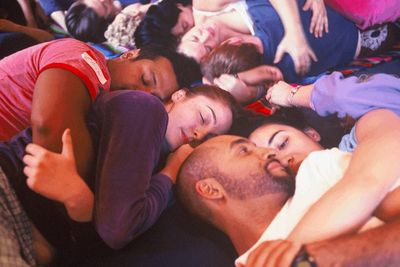NASHVILLE, Tenn. (Wednesday, July 22, 2020) - We know that touch is important. Significant research has been done on it. Some experts claim that we can die without it.
“Babies who are not held, nuzzled, and hugged enough can stop growing, and if the situation lasts long enough, even die,” Author Maia Szalavitz said in Psychology Today. “Researchers discovered this when trying to figure out why some orphanages had infant mortality rates around 30-40%. We now know that orphanages are not suitable places for infants. Babies aged 0-5 simply do not receive enough stimulation in group residential care to develop to their full capacity.”
Whether it’s hugging your friends, shaking hands, or a pat on the shoulder, most have lost these types of connection with those we love during the Coronavirus Pandemic. So, how has that affected the community’s health, and how are people going to respond when touching is a viable option again?
The isolation dilemma, for both couples and singles, could pose an opportunity to learn communication skills when it comes to intimacy and physical nurturing. Adam Paulman, 66, says that his organization can help attendees of their events learn to better communicate their wants and needs. Paulman, of San Diego, is on the Board of Directors for Cuddle Party. Cuddle Party is a trademarked organization that trains people across the globe in how to facilitate cuddle parties. The events are formed to be a platonic expression of nurture and touch. Paulman says there’s a little bit of a brain hack when it comes to the phenomenon.
“If you close your eyes and stroke your forearm, your brain doesn’t immediately register whether someone else is doing it. I’m not a scientist, but the benefits of nurturing touch and the ‘feel good’ endorphins released into your system, can happen even online. The experiences people have are a feeling of closeness, wellbeing and safety.”
The group focuses around boundaries, consent and communication. They have a practicum for people to work on the skills of communication, and get their touch needs met at the same time.
Cuddle Party started in New York City about 13 years ago. A couple was complaining with their friends that they weren’t getting enough touch. On a dare, they decided to throw a cuddle party, laid ground rules, and there was a demand from friends to have another one the same week. Paulman says one of the biggest misconceptions about their organization is that there is no sex or nudity involved, only consenting, nurturing touch.
The parties usually last somewhere between 3-4 hours. They begin with a welcome circle, everyone introduces themselves, then there are activities and teachings for the rules of cuddling and how those might apply. The first rules are that clothing stays on, you don’t have to cuddle anyone you don’t want to, ever, and you don’t even have to cuddle at all.
“We have not been encouraging any in person parties right now, so it has forced many of our groups to come up with different ways to contact each other,” said Paulman. “We started experimenting with online meetings. How can you get those contact needs met? It surprised me in a huge way how many contact needs can be met virtually. It’s not for everyone, but it’s surprisingly effective.”
Paulman says that testimonials range from people telling him the parties have changed their life, to people experiencing consent and nurturing for the first time when it comes to touch. He says the parties are constructed to help people discover their power of consent.
“One person told me they had never been asked for a hug before. Can I hug you?” Paulman said. “They said everyone else never asked. They just grab people and hug them.”
The idea from an observer seems to be a reinforcement that you are in the driver’s seat of who touches you, how you want to be touched, and when and where that happens. Communication without judgement appears to be the driving force of the parties.
“Have you ever said yes to something when you really wanted to say no? Or said no simply because you felt you didn’t deserve it?” asked Paulman. “Wouldn’t it be wonderful to be in an environment where you could just be honest without judgement?”
Paulman says it’s important that people make a distinction that Cuddle Party is not therapy. He says people who facilitate parties may be therapists, but the parties are there to create a safe space where laughter, tears, and expression of desire for touch are all welcome. The group is investigating virtual training, but they have already begun virtual meetings. An unexpected benefit of isolation is that parties that would normally only be local are now opened up to guests around the world.
“If you live more than half an hour away from me, you probably wouldn’t come to my party, but now they are organized by time zone,” Paulman said. “Recent virtual parties have been able to connect people from Russia, Finland, Belgium, Germany, Ireland, England and South Africa.”
Paulman says there have been some language barriers, but the training has been translated into French and Spanish. He says most people who sign up to facilitate speak English at least as a second language.
While the cost for attending the events is left up to the facilitator, in the days of COVID-19, Paulman says he just charges a donation.
“If somebody sends me a dollar it’s just as welcomed to me as someone who sends me $50,” said Paulman. “There are people who really need it, and I want to make it as affordable as possible.”
Related Stories: Mental Health Assistance Available - At a Distance
This article has been supported by a grant from the Facebook Journalism Project for COVID-19 coverage.
